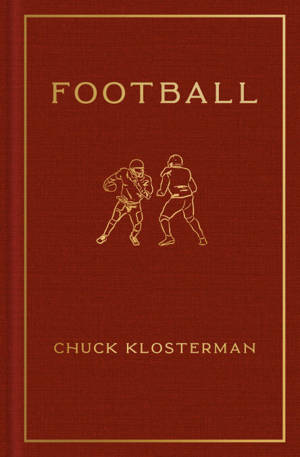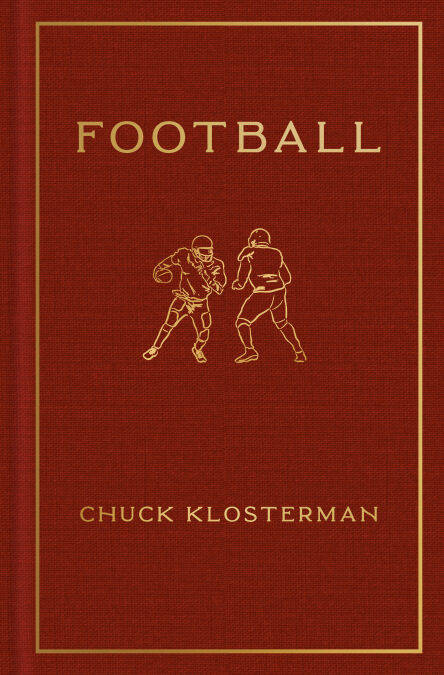
- Retrait gratuit dans votre magasin Club
- 7.000.000 titres dans notre catalogue
- Payer en toute sécurité
- Toujours un magasin près de chez vous
- Retrait gratuit dans votre magasin Club
- 7.000.0000 titres dans notre catalogue
- Payer en toute sécurité
- Toujours un magasin près de chez vous
Description
A hilarious but nonetheless groundbreaking contribution to the argument about which force shapes American life the most. For two kinds of readers—those who know it’s football and those who are about to find out.
Chuck Klosterman—New York Times bestselling critic, journalist, and, yes, football psychotic—did not write this book to deepen your appreciation of the game. He’s not trying to help you become that person at the party, or to teach you how to make better bets, or to validate any preexisting views you might have about the sport (positive or negative). Football does, in fact, do all of those things. But not in the way such things have been done in the past, and never in a way any normal person would expect.
Cultural theorists talk about hyperobjects—phenomena that bulk so large that their true dimensions are hidden in plain sight. In 2023, 93 of the 100 most-watched programs on U.S. television were NFL football games. This is not an anomaly. This is how society is best understood. Football is not merely the country’s most popular sport; it is engrained in almost everything that explains what America is, even for those who barely pay attention.
Klosterman gets to the bottom of all of it. He takes us to a metaphorical projection of Texas, where the religion of six-man football merges with America’s Team [sic] and makes an inexplicable impact on a boy in North Dakota. He dissects the question of natural greatness, the paradox of gambling and war, and the timeless caricature of the uncompromising head coach. He interrogates the perfection of football’s marriage with television and the morality of acceptable risk. He even conjures an extinction-level event. If Žižek liked the SEC more than he liked cinema, if Stephen Jay Gould cared about linebackers more than he cared about dinosaurs, if Steve Martin played quarterback instead of the banjo . . . it would still be nothing like this.
A century ago, Yale’s legendary coach Walter Camp wrote his unified theory of the game. He called it Football. Chuck Klosterman has given us a new Camp for the new age, rooted in a personal history he cannot escape.
Chuck Klosterman—New York Times bestselling critic, journalist, and, yes, football psychotic—did not write this book to deepen your appreciation of the game. He’s not trying to help you become that person at the party, or to teach you how to make better bets, or to validate any preexisting views you might have about the sport (positive or negative). Football does, in fact, do all of those things. But not in the way such things have been done in the past, and never in a way any normal person would expect.
Cultural theorists talk about hyperobjects—phenomena that bulk so large that their true dimensions are hidden in plain sight. In 2023, 93 of the 100 most-watched programs on U.S. television were NFL football games. This is not an anomaly. This is how society is best understood. Football is not merely the country’s most popular sport; it is engrained in almost everything that explains what America is, even for those who barely pay attention.
Klosterman gets to the bottom of all of it. He takes us to a metaphorical projection of Texas, where the religion of six-man football merges with America’s Team [sic] and makes an inexplicable impact on a boy in North Dakota. He dissects the question of natural greatness, the paradox of gambling and war, and the timeless caricature of the uncompromising head coach. He interrogates the perfection of football’s marriage with television and the morality of acceptable risk. He even conjures an extinction-level event. If Žižek liked the SEC more than he liked cinema, if Stephen Jay Gould cared about linebackers more than he cared about dinosaurs, if Steve Martin played quarterback instead of the banjo . . . it would still be nothing like this.
A century ago, Yale’s legendary coach Walter Camp wrote his unified theory of the game. He called it Football. Chuck Klosterman has given us a new Camp for the new age, rooted in a personal history he cannot escape.
Spécifications
Parties prenantes
- Auteur(s) :
- Editeur:
Contenu
- Nombre de pages :
- 304
- Langue:
- Anglais
Caractéristiques
- EAN:
- 9780593490655
- Date de parution :
- 19-01-26
- Format:
- Ebook
- Protection digitale:
- Adobe DRM
- Format numérique:
- ePub

Les avis
Nous publions uniquement les avis qui respectent les conditions requises. Consultez nos conditions pour les avis.






